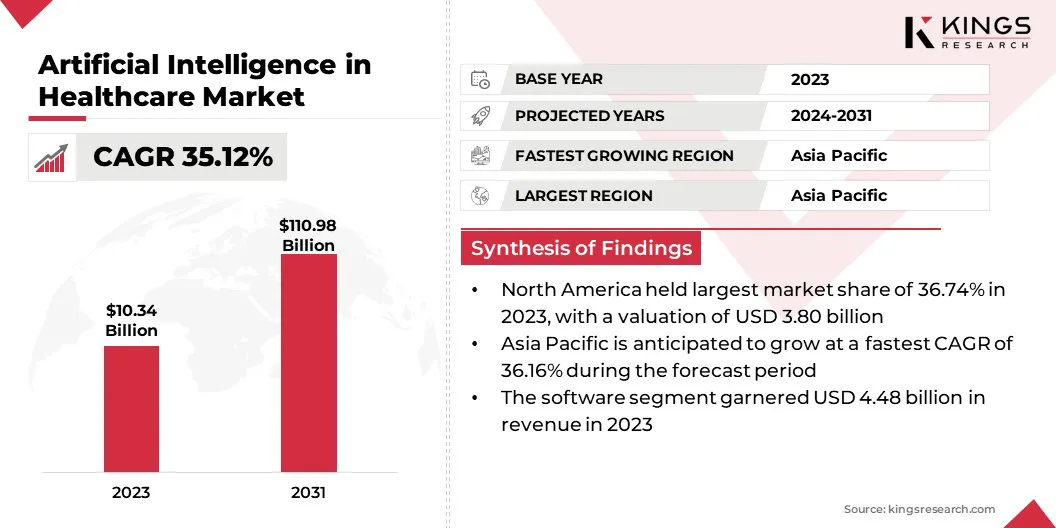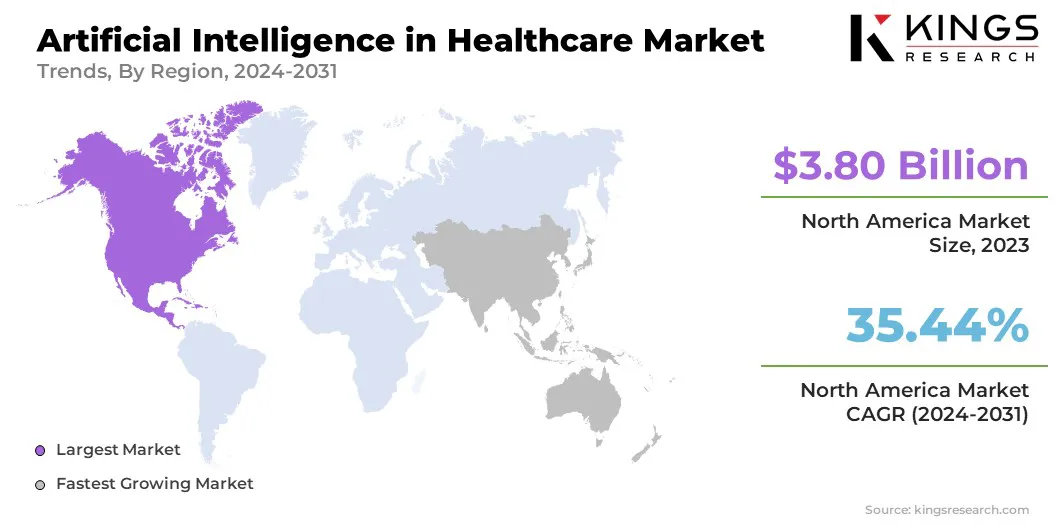Healthcare Medical Devices Biotechnology

Artificial Intelligence in Healthcare Market

Artificial Intelligence in Healthcare Market Size, Share, Growth & Industry Analysis, By Component (Hardware, Software, and Services,), By Application (Medical Imaging and Diagnostics, Drug Discovery and Development, Others), By Technology, By End User, and Regional Analysis, 2024-2031
Pages : 230
Base Year : 2023
Release : January 2025
Report ID: KR1255
Market Definition
Artificial intelligence (AI) in healthcare involves the use of advanced computational algorithms and machine learning techniques to mimic human intelligence in medical applications. AI systems analyze complex medical data, support disease diagnosis, personalize treatment plans, predict health outcomes, and optimize healthcare operations.
Artificial Intelligence in Healthcare Market Overview
Global artificial intelligence in healthcare market size was valued at USD 10.34 billion in 2023 and is projected to grow from USD 13.50 billion in 2024 to USD 110.98 billion by 2031, growing at a staggering CAGR of 35.12% from 2024 to 2031.
The market is experiencing robust growth, driven by technological advancements in machine learning, data analytics, and healthcare innovation. It covers a broad spectrum of applications, including diagnostics, personalized medicine, drug discovery, patient monitoring, and operational automation.
The expansion of the market is further fueled by factors such as the increasing volume of healthcare data, the need for cost-efficiency, and the demand for enhanced patient outcomes.
Major companies operating in the global AI in healthcare market are IBM Corporation, Koninklijke Philips N.V., NVIDIA Corporation, Medtronic, Siemens AG, Microsoft Corporation, Intel Corporation, General Electric Company, Pfizer Inc., Eli Lilly and Company, Epic Systems Corporation., Oracle, Johnson & Johnson Services, Inc., Amazon.com, Inc., Hoffmann-La Roche AG, and others.
As AI technologies are increasingly integrated into healthcare systems, they offer opportunities to streamline processes, improve accuracy, and drive operational efficiencies. This shift is expected to foster innovation, improve healthcare delivery, and enhance overall patient care across various medical specialties.
- In January 2025, Samsung Electronics launched its "AI for All" vision at CES 2025, making AI an integral part of daily life. The initiative combines AI with Samsung Health to deliver personalized health insights through devices such as the Galaxy Ring and Galaxy Watch, creating a seamless, end-to-end health solution for users.

Key Highlights:
- The artificial intelligence in healthcare industry size was recorded at USD 10.34 billion in 2023.
- The market is projected to grow at a staggering CAGR of 35.12% from 2024 to 2031.
- North America held a notable share of 36.74% in 2023, valued at USD 3.80 billion.
- The software segment garnered USD 4.48 billion in revenue in 2023.
- The medical imaging and diagnostics segment is expected to reach USD 39.48 billion by 2031.
- The machine learning segment is projected to register a valuation of USD 52.44 billion by 2031.
- The hospital & healthcare providers segment is estimated to generate a revenue of USD 48.11 billion by 2031.
- Asia Pacific is anticipated to grow at a robust CAGR of 36.16% over the forecast period.
Market Driver
"Adoption of Synthetic Data and Advancement in Real Time Analysis"
The growing volume of healthcare data from sources such as electronic health records and wearable devices is boosting the growth os the artificial intelligence in healthcare market, creating a significant opportunity for AI to process and analyze this information, improving efficiencies and enabling more tailored healthcare solutions.
The use of synthetic data, including synthetic control arms for clinical trials, addresses data scarcity and privacy concerns, enhancing model training and improving the accuracy of diagnostics and personalized treatments.
- In March 2023, Medidata, a Dassault Systèmes company, announced surpassing 30,000 clinical trials and 9 million study participants. This milestone was driven by its platform and innovative solutions, including decentralized trials, AI-based trial design, and Synthetic Control Arms, which have improved access, diversity, and efficiency in clinical studies.
Additionally, AI technologies enable real-time insights during surgeries, enhancing decision-making and improving patient outcomes by providing actionable recommendations and identifying potential complications. These factors are boosting the adoption of AI in healthcare, fostering innovation, improving care delivery, and enhancing operational performance.
- In March 2024, Johnson & Johnson MedTech partnered with NVIDIA to scale AI for surgery. The collaboration aims to integrate NVIDIA’s AI platform with Johnson & Johnson MedTech’s digital surgery ecosystem, enabling real-time, secure analysis of surgical data through advanced edge computing. This leads to enhanced surgical decision-making, education, collaboration, and patient care.
Market Challenge
Bias in AI Algorithm and Model Interpretability
As AI systems rely on large datasets to drive insights, protecting sensitive patient data from breaches and unauthorized access remains a top priority, particularly with increasing data volume. This presents a major challenge to the expansion of the artificial intelligence in healthcare market.
Additionally, AI algorithms may inherit biases from unrepresentative training data, leading to inequitable healthcare outcomes for underrepresented groups, which highlights the need for diverse datasets and ongoing monitoring.
- In July 2023, the U.S. Department of Health and Human Services highlighted the impact of AI and healthcare algorithm bias, which can worsen health disparities, particularly among racial and ethnic groups. It underscored that the lack of diversity in training data and biased assumptions by developers may result in inaccurate and unfair outcomes for underrepresented populations.
Moreover, the "black box" nature of many AI models hinders their adoption in clinical settings, as healthcare professionals require clear explanations of AI decision-making processes. Improving model transparency through explainable AI is essential to building trust, enhancing clinical decision-making, and ensuring accountability in patient care.
Market Trend
"Generative AI and Predictive Analytics"
Growing adoption of generative AI and predictive analysis is emerging as a key trend influencing the artificial intelligence in healthcare market. Generative AI is streamlining clinical processes by generating synthetic data and medical images, enhancing diagnostic precision, and enabling personalized treatment strategies.
Simultaneously, predictive analytics is empowering healthcare providers to proactively manage patient care by analyzing historical and real-time data to predict health risks, facilitating early interventions and improved preventive care.
- In January 2025, Press Ganey introduced expanded AI capabilities designed to help healthcare leaders improve safety and experiences for patients and employees. The new AI features, powered by the industry’s largest integrated dataset, include AI Summarize, AI Compose, and AI Recommend, providing predictive analytics, actionable insights, and efficiency in data analysis.
In the drug discovery sector, AI accelerates the identification and optimization of drug candidates, reducies development timelines, minimizes costs, and supports drug repurposing. These advancements improve patient outcomes, drive operational efficiencies, and position AI as a key factor for innovation and competitiveness in healthcare.
Artificial Intelligence in Healthcare Market Report Snapshot
| Segmentation | Details |
| By Component | Hardware, Software, Services, Medical Imaging and Diagnostics |
| By Application | Drug Discovery and Development, Personalized Medicine, Robotic Surgery, Others |
| By Technology | Machine Learning, Natural Language Processing, Context-aware Computing, Computer Vision, Hospital & Healthcare Providers, Patients |
| By End User | Pharmaceuticals & Biotechnology Companies, Healthcare Payers |
| By Region | North America: U.S., Canada, Mexico |
| Europe: France, U.K., Spain, Germany, Italy, Russia, Rest of Europe | |
| Asia-Pacific: China, Japan, India, Australia, ASEAN, South Korea, Rest of Asia-Pacific | |
| Middle East & Africa: Turkey, UAE, Saudi Arabia, South Africa, Rest of Middle East & Africa | |
| South America: Brazil, Argentina, Rest of South America |
Market Segmentation:
- By Component (Hardware, Software, Services): The software segment earned USD 4.48 billion in 2023, mainly due to the increasing demand for AI-powered healthcare solutions to enhance clinical decision-making and patient outcomes in diverse healthcare settings.
- By Application (Medical Imaging and Diagnostics, Drug Discovery and Development, Personalized Medicine, and Robotic Surgery): The medical imaging and diagnostics segment held a share of 42.40% in 2023, largely attributed to the growing adoption of AI technologies in radiology for faster, more accurate image analysis, early disease detection, and improved diagnostic accuracy.
- By Technology (Machine Learning, Natural Language Processing, Context-aware Computing, and Computer Vision): The machine learning segment is projected to reach USD 52.44 billion by 2031, fueled by its increasing application in healthcare for predictive analytics, personalized medicine, and automated decision-making.
- By End User (Hospital & Healthcare Providers, Patients, Pharmaceuticals & Biotechnology Companies, and Healthcare Payers): The hospital & healthcare providers segment generated a revenue of USD 4.42 billion in 2023, propelled by the growing adoption of AI technologies to improve patient care and streamline administrative processes.
Artificial Intelligence in Healthcare Market Regional Analysis
North America artificial intelligence in healthcare market accounted for a substantial share of 36.74% and was valued at USD 3.80 billion in 2023. This dominance is reinforced by a strong technological infrastructure, significant investments in research and development, and the presence of leading healthcare providers and technology companies.
The regional market benefits from extensive collaborations between academic institutions, healthcare providers, and technology firms, creating a dynamic ecosystem for AI innovations.
The United States contributes significantly to this growth, supported by favorable regulatory frameworks, including FDA guidelines for AI-powered medical devices, and the expnading use of AI in diagnostics, personalized medicine, and drug discovery.
Additionally, the growing demand for efficient healthcare solutions, improved patient outcomes, and cost reductions propel the adoption of AI technologies across North America. This growth is further supported by ongoing investments, digital transformation initiatives, and collaborative ecosystem.

Asia-Pacific AI in healthcare market is expected to grow at the fastest CAGR of 36.16% through the projection period. This rapid expansion is fostered by large-scale investments in healthcare infrastructure, advancements in AI technology, and growing healthcare needs due to a rising population and increasing prevalence of chronic diseases.
Governments across the region are actively promoting AI adoption through strategic policies, funding initiatives, and partnerships with technology companies.
- In December 2024, India’s Union Minister of State for Health and Family Welfare addressed the 21st Health Summit of the Confederation of Indian Industry (CII), highlighting the medical device sector as a sunrise sector with immense growth potential. She emphasized India's position as the fourth largest medical devices market in Asia and discussed the crucial role of AI innovation in addressing healthcare challenges and creating new opportunities.
Regulatory Framework Also Plays a Significant Role in Shaping the Market
- In the U.S., the FDA regulates AI-powered medical devices through clinical trials and approvals. The Federal Trade Commission oversees advertising claims of AI healthcare products, while Health and Human Services and the Office for Civil Rights enforce HIPAA to protect patient data.
- The European Medicines Agency (EMA) monitors the approval and safety of AI-powered medical devices, while the European Commission (EC) enforces the Artificial Intelligence Act, establishing legal standards for AI applications.
- In Asia Pacific, China's National Medical Products Administration (NMPA) regulates AI-driven medical devices, ensuring safety and efficacy, and the National Health Commission (NHC) supervises the integration of AI technologies in healthcare.
- India's Central Drugs Standard Control Organization (CDSCO) regulates AI in healthcare to ensure safety and clinical effectiveness, while the National Health Authority (NHA) provides oversight for AI adoption in India’s healthcare system.
- In Japan, the Pharmaceuticals and Medical Devices Agency (PMDA) regulates the safety and approval of AI-based medical devices. The Ministry of Health, Labour and Welfare (MHLW) supervises AI healthcare applications to ensure compliance with clinical and ethical standards.
- Globally, the World Health Organization (WHO) develops guidelines and frameworks for AI in healthcare, focusing on patient safety and ethical considerations.
Competitive Landscape:
The artificial intelligence in healthcare industry is characterized by a number of participants, including both established corporations and rising organizations.
Startups are rapidly growing, focusing on niche applications such as early disease detection, personalized medicine, and AI-assisted remote monitoring. These startups are gaining traction through significant investments and strategic partnerships with larger healthcare organizations, enabling switf scaling of their innovations.
- For instance, in January 2025, IQVIA and NVIDIA announced a strategic collaboration to advance healthcare and life sciences through advanced AI solutions. This partnership aims to accelerate IQVIA Healthcare-grade AI, enhancing agentic automation of complex workflows across the therapeutic life cycle by integrating IQVIA’s data analytics and domain expertise with NVIDIA’s AI technologies.
List of Key Companies in Artificial Intelligence in Healthcare Market:
- IBM Corporation
- Koninklijke Philips N.V.
- NVIDIA Corporation
- Medtronic
- Siemens AG
- Microsoft Corporation
- Intel Corporation
- General Electric Company
- Pfizer Inc.
- Eli Lilly and Company
- Epic Systems Corporation.
- Oracle
- Johnson & Johnson Services, Inc.
- Amazon.com, Inc.
- Hoffmann-La Roche AG
- Others
Recent Developments:
- In January 2025, NVIDIA partnered with with IQVIA, Illumina, Mayo Clinic, and Arc Institute to accelerate drug discovery, enhance genomic research, and pioneer advanced healthcare services. These collaborations leverage NVIDIA’s AI and accelerated computing technologies to advance clinical trials, drug development, and digital pathology, aiming to transform the $10 trillion healthcare and life sciences industry.
- In December 2024, Viz.ai and Avicenna.AI announced their partnership to integrate Avicenna.AI’s CINA-iPE and CINA-ASPECTS tools into the Viz.ai One platform. The collaboration focuses on enhancing neurovascular patient care by providing clinicians with timely insights from CT scans, improving decision-making and clinical workflows.
- In December 2024, DeepHealth, a RadNet subsidiary, launched AI-powered informatics and SmartTechnology solutions at RSNA 2024. The new portfolio, including Diagnostic Suite, TechLive, and SmartTechnology, integrates AI with imaging systems to enhance efficiency and patient care.
- In December 2024, IBM announced a breakthrough in optics technology with its new co-packaged optics (CPO) solution, designed to improve data center operations for generative AI models. By using high-speed optical connectivity, IBM’s innovation can reduce energy consumption, accelerate AI model training, and increase efficiency.
- In October 2024, Oracle Health unveiled its second-generation Clinical AI Agent at the Oracle Health Summit in Nashville, Tenn. The AI-powered solution enhances physician productivity by automating and unifying clinical workflows, improving documentation accuracy, and simplifying clinical decision-making.
- In April 2024, Bayer partnered with Google Cloud to develop AI solutions for radiology, focusing on improving patient outcomes and supporting radiologists. The collaboration combines Bayer's innovation platform and Google Cloud’s generative AI tools to advance AI-powered healthcare applications, enhance data security, and facilitate scalable medical imaging software development.
CHOOSE LICENCE TYPE
Frequently Asked Questions (FAQ's)
Get the latest!
Get actionable strategies to empower your business and market domination
- Deliver Revenue Impact
- Demand Supply Patterns
- Market Estimation
- Real-Time Insights
- Market Intelligence
- Lucrative Growth Opportunities
- Micro & Macro Economic Factors
- Futuristic Market Solutions
- Revenue-Driven Results
- Innovative Thought Leadership
.webp)